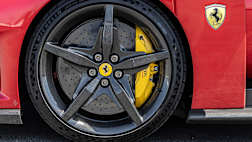So, having sniffed the air - with great care - and established that the end of financial year 2019-2020 is going to be one of the all-time great opportunities to drive a hard bargain on a new car, you’re left with just two questions.
The first is the fun one, which car should you choose to bring you the most joy and/or everyday practicality and utility (and, perhaps, what colour should it be), while the second one is more pragmatic, and may limit your answers to the first question, how are you going to pay for it?
While there’s a lot to be said for saving up for a car you can afford and paying cash - it puts you in a hell of a bargaining position for a start - the opportunities that are available this EOFY, as car dealers struggle to hit their sales targets like never before and thus rush to offer you incredible and possibly unrepeatable deals, are just too good to miss out on.
This means spending money you don’t have yet, as a way of saving yourself money in the long run, but getting you into that much-desired new car sooner. And that means diving into the debt pool of car financing.
However, you shouldn’t be afraid. Cars are expensive - for most of us they are the second largest outlay we ever make - but there are many, many financial institutions out there that are keen to help. Indeed, with the current, slightly calamitous market, lenders may also be a little more keen than usual to offer you a better deal than ever on things like interest rates, just to get some customers on board.
In normal, pre-virus times, the car-loan industry in Australia is absolutely enormous - a lender like St George alone was writing $220 million worth of car loans a month in 2019. According to Positive Lending Solutions, car loans make up slightly more than three per cent of all Australian household debt, which means, if you averaged it out, we’d all have car loans of about $670 each.
In short, you’re not alone if you’re thinking about financing a new car - in 2017, one in five new cars was purchased using a loan in this country, with a whopping $8.5 billion borrowed in total. Throw in used cars and the other kinds of vehicles and the figure hits $16 billion.
Should you use finance to buy a new car?
.jpg)
Just because it’s a popular option, of course, doesn’t mean it’s for everyone, and you’ll always find someone - often your Dad - who will argue that it’s not a good idea to borrow money to purchase a depreciating asset, and that a mortgage and a car loan are thus very different financial transactions.
The fact is, of course, that buying a new, practical, safe and reliable car can both save you money and improve your earning capacity. Driving an old bomb, as we all know, can be far more expensive than a good car, in the long run.
And, again, it’s worth considering just how tempting the deals are going to be this EOFY season. It’s no time to be missing out.
Is anyone going to lend you money?
Well, this will all come down to your credit history, which is how finance companies assess your ability to repay a loan. That and your current income, level of credit card and other debt, and an analysis of your outgoings and disposable income.
Your credit history is vital, of course, and if you have a bad one - because you’ve paid off debts in an irregular or haphazard fashion in the past or, worse still, suffered a repossession of some kind - it’s not going to be helpful. Indeed, it could see you paying much higher interest rates or not getting finance at all.
But even if that is the case, don’t panic. Just do better.
"If you pay on time for 12 months you can re-establish your credit rating and get lower interest rates," our market insider tells us.
"History is that - history. You can turn your credit rating around and that will make life easier and cheaper for the future."
As you may know, finance companies use a points system to determine your repayment capacity, and how much they’ll lend you. They also often use something called the Henderson Poverty Index, which sounds miserable but is actually a sliding scale used to measure your monetary position, like your income, your marital status, how long you’ve been working, how many children you have and so on.
The kind of car you’re looking at will also affect the amount you can borrow and the interest rate you’ll pay - used-car-loan rates are more expensive than new car ones, for example.
What type of car loans are there?

The most common car-finance arrangement is a fixed-rate loan agreement, according to Automotive Holdings Group (AHG), which describes itself as Australia’s largest motoring group.
Fixed-rate arrangements are used by as much as 70 percent of individual purchasers.
Changes to the National Consumer Credit Protection Regulations that effect car dealers and financiers have led to banks tightening their criteria on personal loans over the past couple of years, and that has meant more people are buying through specialised car-loan finance companies - the kind that you’re offered in the dealership when you buy a car.
"There's more rigour in finance because of the regulations," AHG says. "But it has led to more finance being written by dealerships.”
It’s worth keeping in mind, of course, that providing finance is one way a car dealer can clip the ticket when selling a new vehicle, so you might be paying a slightly higher interest rate if you go down this path. It’s worth comparing what other sort of personal loan deals are available - just because it might be more difficult to get a car loan from a bank doesn’t mean it’s impossible.
Other lenders report that people have become more price sensitive - less willing to borrow large amounts, basically - since the GFC, and that trend is only likely to get more extreme as the current economic downturn continues to bite.
Most people are still using what’s called “chattel mortgages” or “consumer credit loans”, which used to be called “hire purchase” agreements. Don’t be confused by the title, all it really means is that the loan is secured against the vehicle you’re buying. If you can’t make the payments, the lender knows it can repossess the vehicle and sell it to get their money back.
In the current market, lenders are also looking to tailor loans for people with low incomes, which means loans extended over longer repayment periods, to keep monthly payments lower.
It’s all about the rate

It is vital to keep your eye on one number, however, which is the interest rate you’re paying. If you’ve got a good credit rating and some security other than the car you’re buying, your house for example, then you are going to get a significantly lower rate. Shopping around can also help to lower the magic number.
As Anthony Keane, Your Money editor points out: “Paying too much interest is like throwing money out the window, and we do plenty of that with new cars that depreciate as soon as we drive away with them.”
Current car loan interest rates range from five per cent to around 10 per cent – or more if it’s unsecured. Getting a deal at the lower end is going to make a big difference in how much you repay on a $20,000 loan over five years, which is vital in these days of watching every dollar we spend.
“Take the time to get two or three quotes from different lenders, and also visit consumer comparison websites such as InfoChoice and Canstar to see the wide range of lenders and options available,” Mr Keane advises.
“Car loan interest rates are higher than your home loan rate and it makes sense to pay down your higher-interest loans first. You can save money by redirecting windfalls such as tax refunds into your car loan if the loan structure allows it, while some people finance their cars using the equity in their homes.”






.jpg)



.jpg)




